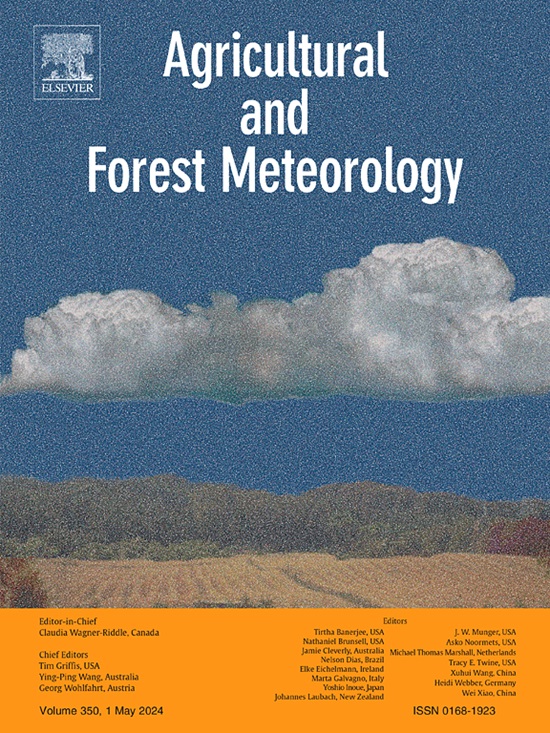韩国冬小麦春霜风险评价
IF 5.6
1区 农林科学
Q1 AGRONOMY
引用次数: 0
摘要
春霜仍然是冬小麦生产的主要气候风险。然而,霜冻风险在气候变化研究中经常被忽视,特别是那些依赖于基于过程的作物模型的研究。本研究利用观测试验数据、基于过程的作物模型和大量气候数据,评估了韩国冬小麦的春霜风险。来自韩国7个地点的试验数据表明,2019/20季节的极端产量损失是暖冬和凉爽的4月共同造成的,暖冬加速了物候变化,而凉爽的4月导致抽穗期发生了几次霜冻。利用校准的DSSAT-Nwheat模型和大量气候数据(HAPPI)进行的预估表明,韩国南部地区春霜造成的产量损失风险将增加。然而,这种风险可以通过改用晚熟品种来减少,以避免春季霜冻。相比之下,虽然中部和北部地区因春霜造成产量损失的风险预计不会显著增加,但这种风险将持续存在,只能通过引进耐霜品种来降低。为了制定提高小麦产量、增强自给自足和确保粮食安全的长期战略,需要将这一分析扩大到包括其他主要压力因素造成的损失,并将其与社会经济分析联系起来。本文章由计算机程序翻译,如有差异,请以英文原文为准。
Spring frost risk assessment on winter wheat in South Korea
Spring frost remains a major climatic risk for winter wheat production. However, frost risk is often overlooked in climate change studies, especially those that rely on process-based crop models. This study assesses the spring frost risk for winter wheat in South Korea using observed trial data, a process-based crop model, and a large ensemble of climate data. Trial data from seven sites across South Korea suggest that the extreme yield loss in the 2019/20 season resulted from a combination of a warm winter, which accelerated phenology, and a cool April, which led to several frost events around heading. Projections with a calibrated DSSAT-Nwheat model and a large ensemble of climate data (HAPPI) suggest that the risk of yield loss due to spring frost will increase in the southern region of South Korea. However, this risk can be reduced by switching to later-maturing cultivars to avoid spring frost. In contrast, while the risk of yield loss due to spring frost in the central and northern regions is not expected to increase significantly, it will persist and can only be reduced by introducing frost-tolerant cultivars. Extending this analysis to include losses from other major stressors and linking it to socio-economic analyses will be needed for developing long-term strategies to boost wheat production, enhance self-sufficiency, and ensure food security.
求助全文
通过发布文献求助,成功后即可免费获取论文全文。
去求助
来源期刊
CiteScore
10.30
自引率
9.70%
发文量
415
审稿时长
69 days
期刊介绍:
Agricultural and Forest Meteorology is an international journal for the publication of original articles and reviews on the inter-relationship between meteorology, agriculture, forestry, and natural ecosystems. Emphasis is on basic and applied scientific research relevant to practical problems in the field of plant and soil sciences, ecology and biogeochemistry as affected by weather as well as climate variability and change. Theoretical models should be tested against experimental data. Articles must appeal to an international audience. Special issues devoted to single topics are also published.
Typical topics include canopy micrometeorology (e.g. canopy radiation transfer, turbulence near the ground, evapotranspiration, energy balance, fluxes of trace gases), micrometeorological instrumentation (e.g., sensors for trace gases, flux measurement instruments, radiation measurement techniques), aerobiology (e.g. the dispersion of pollen, spores, insects and pesticides), biometeorology (e.g. the effect of weather and climate on plant distribution, crop yield, water-use efficiency, and plant phenology), forest-fire/weather interactions, and feedbacks from vegetation to weather and the climate system.

 求助内容:
求助内容: 应助结果提醒方式:
应助结果提醒方式:


